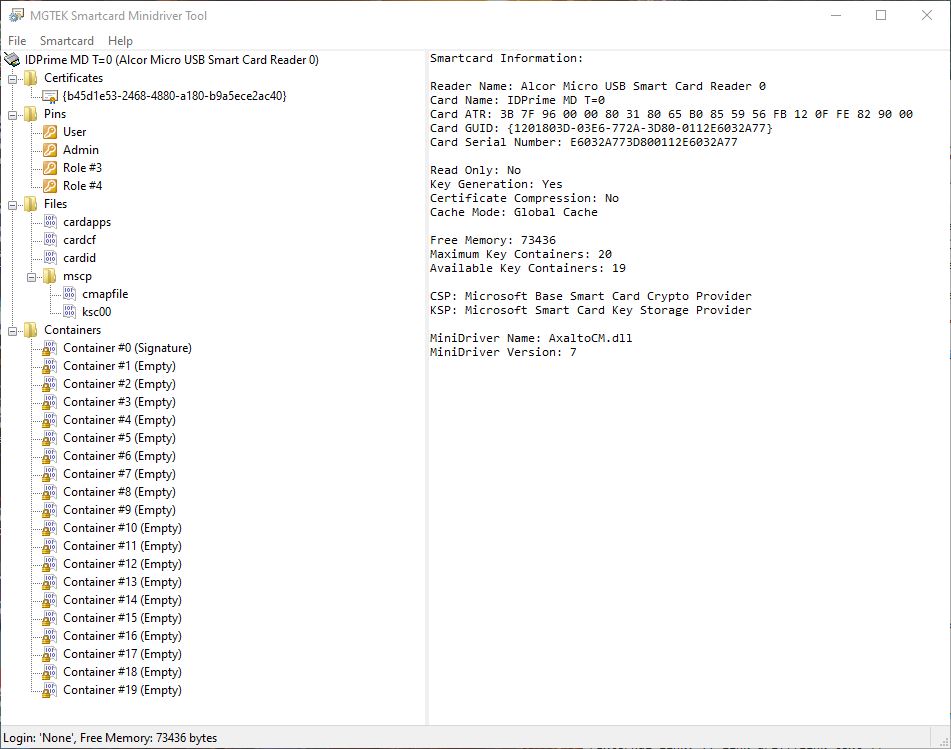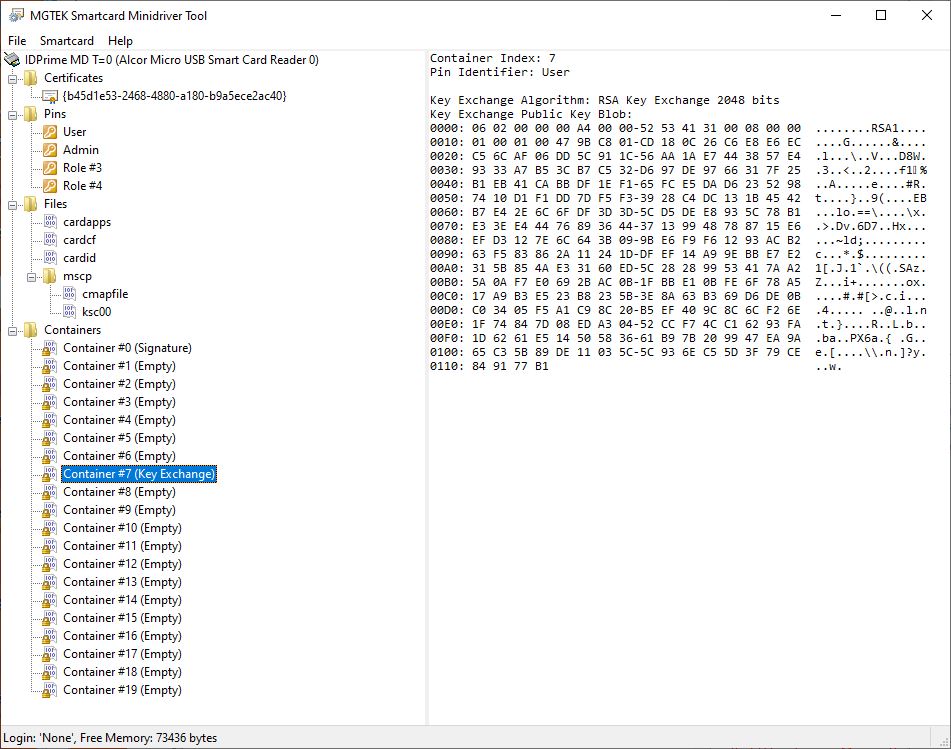|
|
(SQL Server) ScMinidriver - Import Private Key to Smart Card
Demonstrates how to import a private key to the "signature" or "key exchange" location in the Nth key container on a smart card.
-- Important: See this note about string length limitations for strings returned by sp_OAMethod calls.
--
CREATE PROCEDURE ChilkatSample
AS
BEGIN
DECLARE @hr int
-- Important: Do not use nvarchar(max). See the warning about using nvarchar(max).
DECLARE @sTmp0 nvarchar(4000)
-- This example requires the Chilkat API to have been previously unlocked.
-- See Global Unlock Sample for sample code.
-- Chilkat recommends the following free tool for interactively examining the contents of your smart card
-- through the ScMinidriver interface: MGTEK Tool for Minidriver enabled Smart Cards
-- Let's first look at our smart card before importing a private key.
-- Here's the view of our Gemalto (Thales) IDPrime MD T=0 smart card in the MGTEK tool:
 -- First let's load a private key into the Chilkat private key object.
-- (Chilkat provides the ability to load private keys from many different sources and formats.
-- this example loads from a PEM file.)
DECLARE @privKey int
-- Use "Chilkat_9_5_0.PrivateKey" for versions of Chilkat < 10.0.0
EXEC @hr = sp_OACreate 'Chilkat.PrivateKey', @privKey OUT
IF @hr <> 0
BEGIN
PRINT 'Failed to create ActiveX component'
RETURN
END
DECLARE @success int
EXEC sp_OAMethod @privKey, 'LoadPemFile', @success OUT, 'qa_data/rsa/rsaPrivKey_pkcs8.pem'
IF @success = 0
BEGIN
EXEC sp_OAGetProperty @privKey, 'LastErrorText', @sTmp0 OUT
PRINT @sTmp0
EXEC @hr = sp_OADestroy @privKey
RETURN
END
DECLARE @scmd int
-- Use "Chilkat_9_5_0.ScMinidriver" for versions of Chilkat < 10.0.0
EXEC @hr = sp_OACreate 'Chilkat.ScMinidriver', @scmd OUT
-- First we need to acquire a context to the smart card in the reader where it is inserted.
-- Reader names (smart card readers or USB tokens) can be discovered
-- via List Readers or Find Smart Cards
DECLARE @readerName nvarchar(4000)
SELECT @readerName = 'Alcor Micro USB Smart Card Reader 0'
EXEC sp_OAMethod @scmd, 'AcquireContext', @success OUT, @readerName
IF @success = 0
BEGIN
EXEC sp_OAGetProperty @scmd, 'LastErrorText', @sTmp0 OUT
PRINT @sTmp0
EXEC @hr = sp_OADestroy @privKey
EXEC @hr = sp_OADestroy @scmd
RETURN
END
-- If successful, the name of the currently inserted smart card is available:
EXEC sp_OAGetProperty @scmd, 'CardName', @sTmp0 OUT
PRINT 'Card name: ' + @sTmp0
-- To import a private key, we'll need to be PIN authenticated.
-- For more details about smart card PIN authentication, see the Smart Card PIN Authentication Example
DECLARE @pinId nvarchar(4000)
SELECT @pinId = 'user'
DECLARE @retval int
EXEC sp_OAMethod @scmd, 'PinAuthenticate', @retval OUT, @pinId, '0000'
IF @retval <> 0
BEGIN
PRINT 'PIN Authentication failed.'
EXEC sp_OAMethod @scmd, 'DeleteContext', @success OUT
EXEC @hr = sp_OADestroy @privKey
EXEC @hr = sp_OADestroy @scmd
RETURN
END
-- Let's import into the "key exchange" position in key container #7.
EXEC sp_OAMethod @scmd, 'ImportKey', @success OUT, 7, 'kex', @privKey, 'user'
IF @success = 0
BEGIN
PRINT 'PIN Authentication failed.'
EXEC sp_OAMethod @scmd, 'DeleteContext', @success OUT
EXEC @hr = sp_OADestroy @privKey
EXEC @hr = sp_OADestroy @scmd
RETURN
END
EXEC sp_OAMethod @scmd, 'DeleteContext', @success OUT
PRINT 'Success.'
-- Here's the MGTEK view of the smart card after importing the private key:
-- First let's load a private key into the Chilkat private key object.
-- (Chilkat provides the ability to load private keys from many different sources and formats.
-- this example loads from a PEM file.)
DECLARE @privKey int
-- Use "Chilkat_9_5_0.PrivateKey" for versions of Chilkat < 10.0.0
EXEC @hr = sp_OACreate 'Chilkat.PrivateKey', @privKey OUT
IF @hr <> 0
BEGIN
PRINT 'Failed to create ActiveX component'
RETURN
END
DECLARE @success int
EXEC sp_OAMethod @privKey, 'LoadPemFile', @success OUT, 'qa_data/rsa/rsaPrivKey_pkcs8.pem'
IF @success = 0
BEGIN
EXEC sp_OAGetProperty @privKey, 'LastErrorText', @sTmp0 OUT
PRINT @sTmp0
EXEC @hr = sp_OADestroy @privKey
RETURN
END
DECLARE @scmd int
-- Use "Chilkat_9_5_0.ScMinidriver" for versions of Chilkat < 10.0.0
EXEC @hr = sp_OACreate 'Chilkat.ScMinidriver', @scmd OUT
-- First we need to acquire a context to the smart card in the reader where it is inserted.
-- Reader names (smart card readers or USB tokens) can be discovered
-- via List Readers or Find Smart Cards
DECLARE @readerName nvarchar(4000)
SELECT @readerName = 'Alcor Micro USB Smart Card Reader 0'
EXEC sp_OAMethod @scmd, 'AcquireContext', @success OUT, @readerName
IF @success = 0
BEGIN
EXEC sp_OAGetProperty @scmd, 'LastErrorText', @sTmp0 OUT
PRINT @sTmp0
EXEC @hr = sp_OADestroy @privKey
EXEC @hr = sp_OADestroy @scmd
RETURN
END
-- If successful, the name of the currently inserted smart card is available:
EXEC sp_OAGetProperty @scmd, 'CardName', @sTmp0 OUT
PRINT 'Card name: ' + @sTmp0
-- To import a private key, we'll need to be PIN authenticated.
-- For more details about smart card PIN authentication, see the Smart Card PIN Authentication Example
DECLARE @pinId nvarchar(4000)
SELECT @pinId = 'user'
DECLARE @retval int
EXEC sp_OAMethod @scmd, 'PinAuthenticate', @retval OUT, @pinId, '0000'
IF @retval <> 0
BEGIN
PRINT 'PIN Authentication failed.'
EXEC sp_OAMethod @scmd, 'DeleteContext', @success OUT
EXEC @hr = sp_OADestroy @privKey
EXEC @hr = sp_OADestroy @scmd
RETURN
END
-- Let's import into the "key exchange" position in key container #7.
EXEC sp_OAMethod @scmd, 'ImportKey', @success OUT, 7, 'kex', @privKey, 'user'
IF @success = 0
BEGIN
PRINT 'PIN Authentication failed.'
EXEC sp_OAMethod @scmd, 'DeleteContext', @success OUT
EXEC @hr = sp_OADestroy @privKey
EXEC @hr = sp_OADestroy @scmd
RETURN
END
EXEC sp_OAMethod @scmd, 'DeleteContext', @success OUT
PRINT 'Success.'
-- Here's the MGTEK view of the smart card after importing the private key:
 EXEC @hr = sp_OADestroy @privKey
EXEC @hr = sp_OADestroy @scmd
END
GO
EXEC @hr = sp_OADestroy @privKey
EXEC @hr = sp_OADestroy @scmd
END
GO
|

